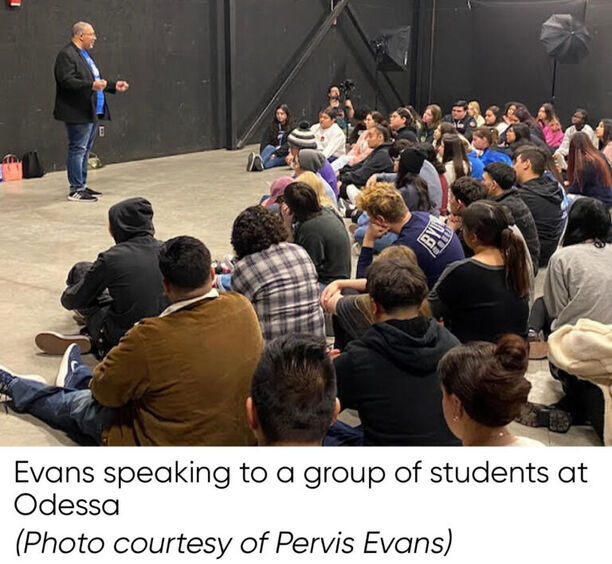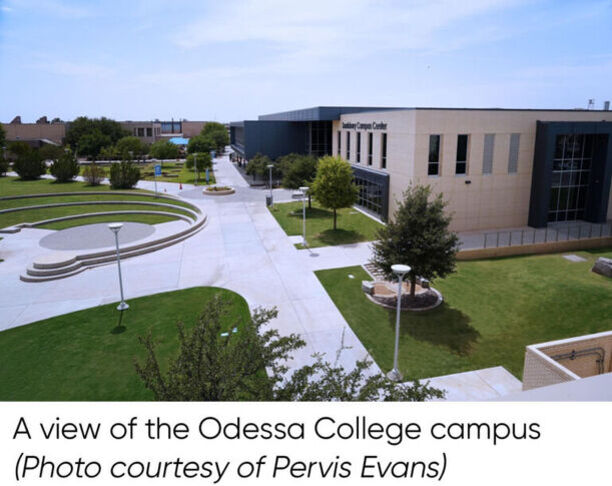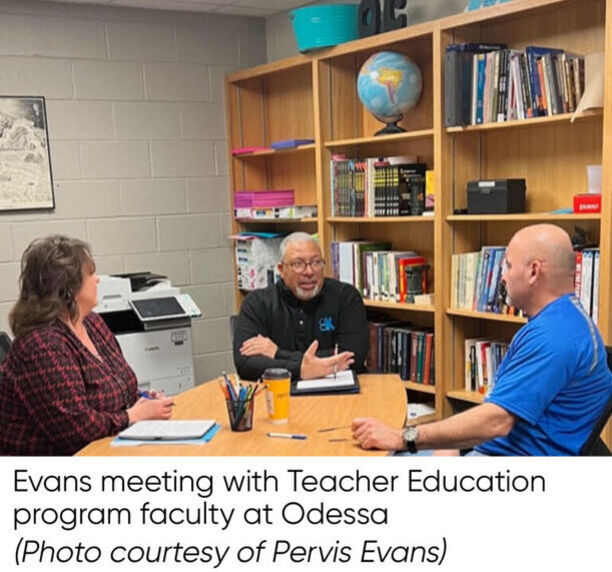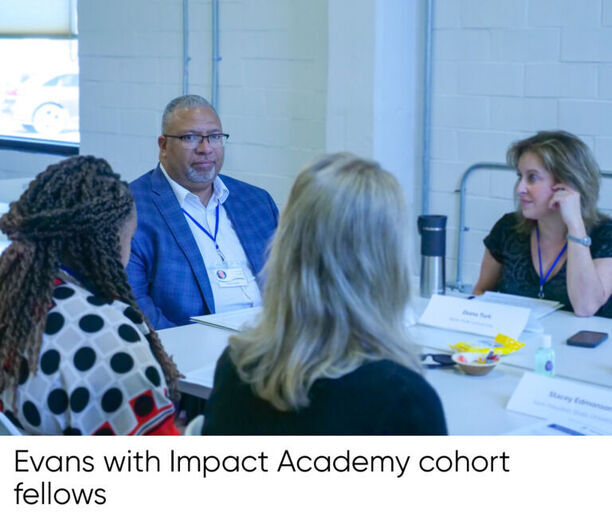Posted on
For Dean Pervis Evans, student perspective is essential to strengthen and diversify teaching workforce
Category: Leadership
Sitting in on EDUC 1301: Introduction to the Teaching Profession at Odessa College last semester, Pervis Evans is conscious that he doesn’t quite fit in with the other students, a majority of whom are recent high school graduates. But that doesn’t deter him at all.
Just as much as they are, he’s attending as an enrolled student, completing assignments and participating in discussions – and, he also happens to be the community college’s Dean of Liberal Arts and Education.
“They probably knew I was the dean,” he says with a laugh, explaining that some students were a little wary of talking to him. But in immersing himself in the class as a student, Evans is able to experience firsthand what the coursework and discussions are communicating to students – many of whom are aspiring teachers – about the complex field and profession of teaching. He’s able to witness the incredible thoughtfulness with which students engage in discussion, encourage one another, and immerse themselves in building a foundational understanding for what it means to be a classroom teacher in today’s context.
He’s also able to assess from both the student and dean perspective: what are the values students are taking away from this introductory course? How well does the course explicitly define the pathways and benefits of becoming a certified teacher within the region? And what can the college do to keep prospective future teachers on a pathway to teaching and to providing excellent, equitable instruction for the K-12 students they’d ultimately serve?
The decision to experience the course firsthand as a student is rooted in Evans’s adaptive leadership challenge through Impact Academy, DFI’s year-long fellowship for deans and leaders of educator-preparation programs. The fellowship is designed to support leaders to address the urgent and long-term challenges facing the teaching profession by grounding their leadership and programs in practices that champion rigorous, equitable, and inclusive learning experiences for aspiring teachers and the students they’ll ultimately serve. Over the course of the year, Impact Academy fellows identify an adaptive challenge they wish to address that requires them to think and operate differently, then work towards planning and enacting the change they hope to see.

Responding to community needs
Odessa College is a Hispanic Serving Institution situated in the Permian Basin in west Texas, which has seen rapid population growth over the past few years due to its booming oil and gas industry. Of the current local K-12 student population, a majority are students of color; additionally, one-fifth of students in the largest public school district identify as emergent bilingual.
Evans notes that a priority of the region’s education sector is to recruit, produce, and retain enough qualified teachers to keep up with the growth. Additionally, Odessa’s teacher preparation efforts are centered in being “intentional about understanding, recruiting, and including the perspectives of teacher-candidates who represent the diverse demographic we serve,” he explains. He’s also seeking to recruit and prepare more male teachers of color to help close equity gaps in a region where there are more male students than female students, but female teachers outnumber male teachers three-to-one.

Evans’s leadership challenge through Impact Academy focuses on examining the impact of entry-level courses like EDUC 1301 in attracting diverse teacher-candidates, and translating those values to other courses to market the profession to more students, especially non-education majors. Odessa has seen growing student enrollment numbers over the last nine years, which the college attributes to their deep, intentional investment in student engagement and support services. While the growth is encouraging, Evans also acknowledges the need to not only focus on recruitment, but also continuously hone the quality of preparation and support teacher-candidates receive to be successful long-term.
Additionally, Evans and program faculty have been intentional in offering several pathways to teaching that are affordable and responsive to the reality that people come to the profession from a diverse range of life circumstances. Odessa recently developed its own teaching baccalaureate program but continues to maintain strong partnerships with local universities where students can alternatively opt to finish their teaching degrees.
“There’s so much intersectionality between academics and some of the other social implications that might impede on students’ progress,” Evans explains. “So it is important to me that we do whatever we can to attract the right people to education and then prepare them with the necessary tools to meet K-12 students where they are and to support their success with a holistic approach to teaching and learning.”

It’s work Evans is not only passionate about but understands deeply, having grounded his career in addressing issues of inequity through roles across K-12, higher education, a state agency, and social services. Having held multiple vantage points, Evans is hyper-aware of the complexity of the education system and the barriers it’s created for students from historically marginalized communities. He’s cognizant of not bandaging issues but addressing root causes – through dedicated attention to analyzing evidence, carefully choosing metrics, and organizing for collective impact.
Impact Academy keeps intentionality and good work ‘at the forefront’
The importance of focusing on root causes also holds true to working towards an adaptive leadership challenge at Impact Academy. Evans’s decision to enroll in EDUC 1301 as part of his chosen challenge enabled him to think differently about the needs of the students he serves, as well as how he might come to learn more about their experience firsthand. He attributes much of his ability to maintain this high level of intentionality in his current role to the fellowship’s monthly learning sessions, coaching conversations, and opportunities to be in community with the other 19 fellows in his cohort.
“Not everyone understands the challenges and rewards that come with this particular assignment as a dean,” he says. “I came in expecting my adaptive challenge to be one thing, but in speaking with DFI facilitators and my colleagues in the cohort, I was challenged to think more deeply, and there were some things that surfaced that I needed to look at in terms of my leadership.”
And, with the vast quantity of responsibilities ed-prep leaders hold, “It has been really helpful to have focused time on these tasks. It’s easy to put good work on the back burner to take care of the day-to-day demands, but [Impact Academy] keeps it at the forefront so that we can move forward with the steps that it takes to see the outcomes we want.”

